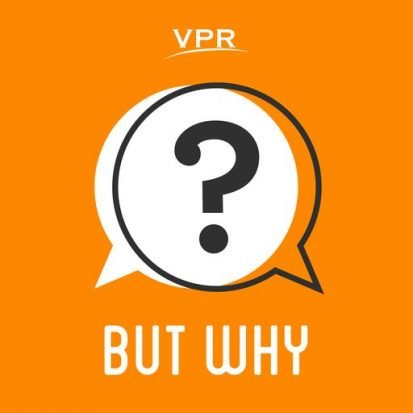
Why do we have friends?
Leave a reviewWhy do friends care about each other? How do you make friends? Can you have more than one best friend? How do you deal with a bully? We answer questions about friends and bullies with Dr. Friendtastic (also known as Eileen Kennedy-Moore), a psychologist and author of Growing Friendships: A Kids’ Guide to Making and Keeping Friends. And we get lots of advice from kids themselves about how to make friends and deal with bullies.
© Vermont Public | 44:37
|Episode: 186 |
Full episode description
 Episode One: But Why: Intro For Adults
Episode One: But Why: Intro For Adults
This is an Episodic show. You can listen to it in any order, but episode one is always a great place to start.Full Episode description
Why do friends care about each other? How do you make friends? Can you have more than one best friend? How do you deal with a bully? We answer questions about friends and bullies with Dr. Friendtastic (also known as Eileen Kennedy-Moore), a psychologist and author of Growing Friendships: A Kids’ Guide to Making and Keeping Friends. And we get lots of advice from kids themselves about how to make friends and deal with bullies.
Download our learning guides: PDF | Google Slide | Transcript
Friendship is often about action. It’s about what we do together, how we treat each other. The key to friendship is kindness.
Best friends are nice, but the word “best” can make it feel like a contest. Most people have different friends and for different situations. So it’s okay to have several close friends instead of needing to identify just one best friend.
Some people have lots of friends, but other people may just have a few close friends. People with more friends tend to put more effort into having more friends. It’s okay to have a lot of friends or just a few!
To make friends, you have to show an openness to friendship. That can be as easy as smiling or saying hi. It’s also important to be kind to potential friends. And it also helps to identify people who have similar interests to you. Then, invite them to do something. Kids make friends by doing fun things with other kids. Don’t wait until you feel close to someone to invite them to do something; you become close by doing shared activities.
Shy people might be unintentionally sending the message to potential friends that they don’t like them. Stop focusing on being uncomfortable and instead look the other kid in the eye (or the forehead if eye contact is hard for you), smile and say hello. Practice it with an adult.
At recess or on the playground, bigger groups of kids will be more open to you joining than groups with just two or three kids.
Research shows that instead of asking if you can play with a big group, hang back and watch for a few minutes to figure out the game the other kids are playing, and then just join in. If you ask “Can I play with you?” you risk interrupting the play.
Bullying is deliberate (intentional) meanness directed at one person where there is an imbalance of power. For example, an older or more popular kid picking on a younger or less popular kid.
It’s important to know the difference between bullying and meanness. Bullying requires adult intervention. If you’re having a problem with a friend that is not bullying, you may still want to talk that through with an adult, but it’s often possible to handle that conflict with your friend on your own.
© Vermont Publicbop| Status: Active, 224 episodes | Kind: Episodic | Episode URL
The content, Artwork and advertising within this podcast is not owned or affiliated with Sound Carrot and remain the property of their respective owners.



![The Rise of the Dinosaurs [ENCORE] The Rise of the Dinosaurs [ENCORE] episode logo](https://soundcarrot.com/wp-content/uploads/2022/09/a3de88f59b0b62b5-150x150.jpeg)




